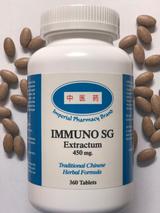REVIEWING SOME ACTIONS OF REHMANNIA GLUTINOSA:
Rehmannia Glutinosa is an herb traditionally used in many TCM medicinal formulas. It is classified as a strong yin tonic. This herb is very effective in lowering the level of PSA, reducing prostate inflammation, and improving urine flow in patients with signs of yin deficiency presenting either benign prostatic hypertrophy or prostatic neoplasia. There is also clinical evidence of the effectivenes of this herb in curing or improving yin defficiency type of diabetes (a pathology that diminish the pancreas secression of insulin). Rehmannia Glutinosa is one of the major ingredients in many classical TCM formulas such as "Liu Wei Di Huang Wan", "Da Bu Yin Wan", "Shi Chuan Da Bu Wan", etc. These herbal formulas are best used when prescribed professionally according to the patient's sings and symptoms.
Rehmannia Glutinosa is safe and effective to support "kidney yin" and promote prostate health. Protecting the prostate with a healthy diet, physical exercises, and herbal supplements with Rehmannia Glutinosa is very important. Even if the PSA shows normal levels, prostate "preventive" care should be a priority for any man over 50 year of age. See the following study on PSA correlation to prostate cancer:
Can You Reassure Elderly Men with Normal PSA Levels?
Thompson, Internal Medicine, et al. New England Journal of Medicine
Normal PSA levels in elderly men should not be cause for reassurance that cancer does not exist because a rise in PSA level at any range should be a cause for concern about cancer, researchers say.
Over the past 2 decades, the serum PSA level has been increasingly used to screen for prostate cancer, considered an accompaniment to digital rectal exam. Despite the lack of solid evidence that PSA screening saves lives, its use has become widespread. Once PSA screening became widespread in the United States, the rate of death from prostate cancer declined (a decline of 50-70 percent between 1986 and 1999 among men 50 years and older). Even though improvements in treatment may partially explain the decline, there is widespread acceptance of the test among primary care physicians and patients. PSA levels rise with prostate disease, both benign and malignant.
The cutoff for normal has been established at 4.0 ng/mL to detect the majority of cancers while avoiding the high cost of false-positive tests. Even levels above 4.0 ng/mL turn out to be benign disease (prostatic hypertrophy or chronic prostatitis) more often than cancer. Ninety percent of men age 50 to 92 years have PSA levels of 4.0 ng/mL or less, so consideration for prostate biopsies would only come up in 10% of screened men. Following a mildly elevated PSA level is done commonly to avoid the use of an invasive and uncomfortable biopsy.
How much can we reassure men with normal PSA levels (4.0 ng/mL or less)? The data from this large study show that such reassurance must be done with caution. The multicenter Prostate Cancer Prevention Trial gave Thompson and colleagues 2950 men with consistently normal PSA levels over seven years to undergo a prostate biopsy. This remarkable data set may never be repeated. Overall, in these men age 62 to 91 years, 15.2% had prostate cancer on biopsy. There was no stratification with age, but there was by PSA level. When the PSA level was 0.5 ng/mL or less, the prevalence of prostate cancer was 6.6%. When the level was 0.6 to 1.0 ng/mL, the prevalence of cancer was 10.1%. When the level was 1.1-2.0 ng/mL, the prevalence of cancer was 17.0%. When the level was 2.1- 3.0 ng/mL, the prevalence was 23.9%. When the level was 3.1-4.0 ng/mL, the prevalence was 26.9%. The prevalence of high-grade tumors increased with PSA level, being 12.5% of the cancers with a PSA level of 0.5 ng/mL or less, and 25.0% of cancers with a PSA level of 3.1-4.0 ng/mL.
"This study caused me much alarm," says Joseph E. Scherger, MD, MPH, clinical professor at the University of California in San Diego. "I recall the reassurance that I have given hundreds of men with normal PSA levels. My words will now be one of reassurance mixed with caution. A look at this data made me think the normal cutoff for PSA should be lowered, at least to 3.0 ng/mL. The editorial in the same issue by Carter reversed my thinking, and I highly recommend reading it. Carter was able to use previous data to show that these results would be expected in a population of 90% of men in this age range. He argues effectively that the cutoff range for PSA should not be changed from the current level of 4.0 ng/mL. The new information for me to use in clinical practice is the tracking of "PSA velocity" in the normal age range. PSA velocity refers to the rate of rise of PSA levels, which has been shown to correlate directly with the risk of cancer. Carter's work suggests that a rise of 0.75 ng/mL or more in a year would indicate a significant risk for cancer. This study was based on small number men (38).
"So, what do we tell men about their PSA levels and when should screening be done? The answers to these questions are not definitive and may never be. Hopefully soon we will have better biomarkers for prostate cancer than the current PSA test. Meanwhile, I will provide cautious reassurance to men with normal levels, and will repeat them yearly to look for a significant change."
Source: Thompson IM, et al. N Engl J Med 2004;350:2239-2246.
Regreso







